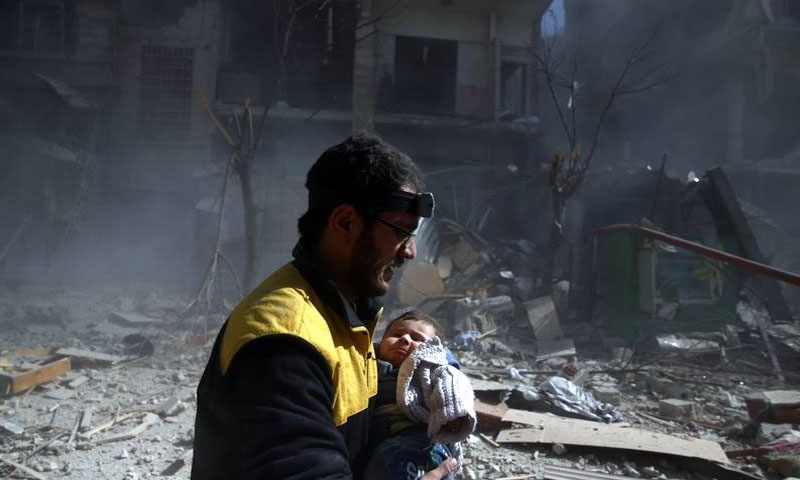The generalizations which the “Revolutionary Leadership Council in Damascus and Its Countryside” has issued triggered different perspectives, for it necessitated that the civil society organizations in eastern Ghouta should pay a visit to the Civil Affairs Department at the Leadership’s quarters to get a notice that allows them to function in the areas under its control.
Activists in these organizations expressed their resentment over these demands, observing them as an intervention in the organizations’ affairs, while others have viewed them as a step to regulate and contextualize the work, based on the principle of transparency.
The “Revolutionary Leadership” believes that establishing a Social Affairs Department would empower the civil society organizations; it has already started collecting data and issued a generalization that requires from the institutions, which function within the frame of the Council, to provide the Department with information about their work and its volume. This has been confirmed by the Head of the “Revolutionary Leadership Council,” Yasser al-Qaderi, who told Enab Baladi, that these administrative procedures raise the level of integrity and transparency and annihilate some of the administrative and finical corruption accusations directed against some of the organization, a thing that in itself is an enhancement for the targeted institutes.
For its part, the Damascus Countryside Governorate Council, under the Interim Government, last year established an office to issue licenses, which functions in cooperation with the Social Affairs Authority in Damascus Countryside Directorate, in terms of registration and licensing, according to Khalil Aybour, the Director of the Licenses Office in the Governorate’s Council.
Aybour told Enab Baladi that the licenses demanded by the Governorate include the civil society organizations in terms of the areas in which they function, their various specialties and different fields of action.
Is It a License or a Notice?
Within the regulatory frame of the institutional work, Damascus Countryside Governorate Council demanded that the organizations, active in the fields of social affairs, present licenses to practice their work in the area. The “Revolutionary Leadership,” for its part, had different requirements, for it asked the organization to admit a “notice,” according to the Consultative Member of the “Local Council” in the city of Hamouriyah, Mohammad al-Khatib, who said that the Leadership has requested the license that organizations obtain from Damascus Countryside Governorate Council.
Al-Khatib believes that the procedures are positive and that there is not a contradiction between a notice and a license which are issued by the Governorate Council, considering that the Leadership has a legitimate right to demand a notice in the areas under its control, being the authority there. Al-Qaderi, the Head of the Leadership Council, views this as a necessity imposed by the deteriorating situation and the authority’s vacuum that led to chaos and prevalence of corruption, in addition to other negative phenomena.
Khalil Aybour stresses the positive response on the part of the organizations, for most of the organizations which are active on the ground, have obtained licenses in the past year and are now applying for renewal.
Organizations Refusing Intervention
Contrastingly, other organizations regarded these demands as steps to limit their efforts and intervene in their affairs by the “Leadership Council.” Al-Khatib attributed some of the organizations’ refusal to their belief that the “Leadership Council” is being run by militants, backed by civil organizations and local councils.
Al-Qaderi, however, had another point view, that the Leadership, being keen on the public interest, is approaching the files and setting priorities starting with the less complicated issues and that it is, flexibly and positively, dealing with the initiatives centralizing around organizing civil action, through empowering the institutions and positively intervening in the files that touch people’s lives in a direct manner.
Khalil Aybour also believes that these procedures do not impose any form of restriction or complexity on the institutions; rather, they are given a governmental document through the councils to protect them, as much as possible, of any internal assaults, and they also bestow these institutions with a sense of integrity and authenticity, that they actually exist and are not fake.
Three Bodies Run Ghouta’s Affairs
The reality imposed on eastern Ghouta, especially after the internal conflict in the area, triggered a military division and a parallel civil one.
Duma and al-Marj are, thus, managed by the “Unified Leadership,” under “Jaysh al-Islam;” the central sector is run by the “Revolutionary Leadership in Damascus and Its Countryside,” in addition to the Governorate Council, under the Interim Government, that functions in the two areas.
Ghouta is suffering from the division that is hindering the work of the organizations, as each of the bodies in control has its own separate regulations and procedures.
Mohammad al-Qaderi confirms that the “Revolutionary Leadership” poses a different model from the mentioned bodies, for it has been formed, according to his description, as a result to the partnership between the Secretariat representing the local civil society and the “Free Army,” represented by “Faylaq al-Rahman.”
The “Revolutionary Leadership,” within the context of its work, represents a supervisory authority that takes political, military, security decisions and forms a reference to magistrateship and the police, while the Governorate Council is regarded as an administrative unit that includes a number of sectors, representing an administrative frame for the local councils.
Concerning the coordination among the three bodies, Aybour explains that Damascus Countryside Governorate Council with the “Revolutionary Leadership” and the “Unified Leadership” has conducted a number of meetings to discuss coordination, adding that in relation to the issue of the demanded licenses, there was no coordination, for both of the leaderships have not yet officially announced it.

